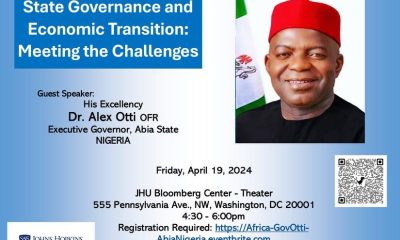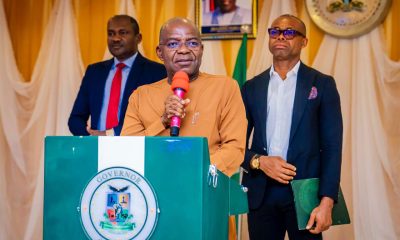Features
Alex Otti: When a prophet is vindicated

BY EMEKA EJERE
With Nigeria now in last-minute effort to avert an imminent recession, the second in less than four years, eminent economist and banker, Dr. Alex Otti, will certainly not be a happy man. He knows that the nation would have been saved from the woods of the moment were the policymakers willing to listen to the voice of reason,
At different fora and in different platforms, Mr. Otti has never minced words in his case for a more efficient management of the nation’s limited resources, enhancement of productivity and diversification of the economy away from oil as ways of becoming competitive at the international arena.
He has constantly drawn attention to the danger the badly structured nature of the economy portends for the country. One area that has continued to worry him most is the fact that the nation seems to be stuck in a situation of perennially dedicating over 70 per cent of her budget to recurrent expenditure while less than 30 per cent is allocated to capital expenditure.
While the argument over expenditure mix raged, the revenue debate also assumed centre stage, with the financial guru actively involved. Nigeria has overtime only been able to achieve about half of the revenue targets of her annual budgets, available records have shown. Otti believes that in situations where the budgets make provisions for deficits like has been the case in the last five years, it simply means that the realisable revenues are less than 40 per cent of the targets in real terms.
For him, since the total revenue for any specific period is finite, expenditure should be made subject to revenue. In other words, as revenue expands, expenditure can be allowed to increase in accordance with Parkinson’s law which states that ‘expenditure will always rise to meet income’.
He had thrown more light to the issue in an interview with Business Hallmark last year: “When you are only able to make 50 percent of the revenue, whether you print money there are costs to it. It means that the 30 percent that you allocated to capital expenditure, then you are only able to manage less than 15 percent.”
This, he opined, was a big problem that needed urgent attention to save Nigeria from a grave financial problem from 2020. “Then we have a big problem, in fact, if we do not do something about it, then we will have real financial crisis from 2020. Everyone who understands economics will have to put on their thinking cap and see how we can bring down the cost.”
His audience at the time and members of Business Hallmark interview panel may see the economic quagmire of the country today, which has been compounded by the COVID-19 pandemic, as a fulfillment of a prophecy. But Otti, a man of numbers, with the skill of putting figures together and calling the future correctly, may not see it as so
Weak budget
Despite the review of the 2020 national budget to accommodate the COVID-19 realities the issues raised by Otti still beg for answers. The initial 2020 national budget of N10.59 trillion was an increase of 2.5% from the 2019 budget of N8.92 trillion. The budget “for sustainable growth and job creation” set aside N453b, representing 4% of total expenditure, for social intervention. This was to be managed by the newly created Ministry of Humanitarian Affairs, Disaster Management and Social Development. This Ministry was given the mandate to focus on the avowed goal of lifting 100m Nigerians out of poverty in 10 years.
The budget estimate was based on some fundamental assumptions. Exchange rate was kept steady at N305 per dollar. GDP growth was estimated at 2.93%. Oil production benchmark was put at 2.18 mbpd. Inflation was estimated at 10.81% for the year.
Again, government projected a 7% rise in revenue from 2019 budget figures. This was going to be achieved partly with an increase in Value Added Tax (VAT), from 5% to 7.5%. To cushion the effect of this increase, government insulated the lower rungs of the SMEs from VAT registration. Companies whose annual turnover was below N25m were exempted from VAT registration.
However, realising the havoc the COVID-19 pandemic had wreaked on the economy, the government had sent a reviewed budget to the National Assembly. The objective was to cut down the budget by over N71.5b to a lower figure of N10.52t. Oil benchmark was also reduced from $57 to $25 per barrel while oil production was reduced from 2.18mbpd to 1.94mbpd. Revenue projection was reduced to N5.16t from N8.42t. This represents a drop of close to 40% or N3.26t.
Given that the CBN had already adjusted the value of the Naira against the dollar, the revised budget increased exchange rates from N305 to N360. Statutory transfers were reduced from N560.5b to N407.8b, a drop of N152.7b. Capital expenditure was reduced by N155b from N2.78t to N2.62t. Recurrent expenditure reduced by N25b from N4.49t to N4.46t. Fiscal deficit, therefore grew from N2.17t to N5.37t, which is expected to be financed through fresh borrowing.
Mr. Otti believes that there is nothing to cheer about over either the original budget or the revised one. He gave his reason in his column titled, ‘Nigeria: Budget 2020 – Reducing the numbers upward’, “This is because just like we said last year, your average share in this budget does not leave you any better than where you were last year. Your share as an individual, is just $150 or N54,000.00, yes fifty- four thousand Naira for the year.”
He argued, “It means that if the budget were to be shared equally to everyone you will go home with N4,500.00 per month. Compare that with our counterparts in South Africa and Angola who will go home with $2,200.00 and $1,200 each, per year”.
Of course, he should know. With a first-class degree in Economics that saw him emerging the overall best graduating student and valedictorian of the University Port Harcourt in 1988, professional trainings from some of the world best institutions of learning, including Harvard Business School, Otti can conveniently be described as an encyclopedia of Economics and Finance.
As a banker he rose through the ranks to the top of his career before opting to follow his passion and “abiding desire to contribute more directly to the overall economic and political transformation of his beloved Abia State in 2014.”
But that was not until he had, within four years, taken the now defunct Diamond Bank from a little above a fringe player in the fiercely competitive Nigerian banking landscape to one of the best positioned in the country by all indicators, even with significant presence on the continent and beyond,
Rescue from bondage
One would have thought that a man with such a tested competence will not face stiff opposition in his quest to deploy his wealth of experience in transforming his home state in the capacity of governor.
Abia, a state that prides itself as God’s own state, has ironically become a commonly cited example of a grossly misgoverned state. And as far as Otti is concerned, this narrative must be changed and the people rescued from an age-long bondage, hence his decision to join politics in 2014 ahead of the 2015 elections.
As expected, it did not take much time for him to win the support of the masses who easily saw in him the willingness to do things differently. They went ahead and said so through their ballots. But the Independent National Electoral Commission (INEC) and subsequently the court decreed otherwise.
But knowing that the road to his destination would not be smooth, Otti has continued to keep hope alive. Facing a sitting governor that was out to throw money around and a ruling party with the federal might, in 2019 elections proved even more trying for him. He placed third.
Otti has not still given up. Instead he has officially declared for the All Progressives Congress (APC), with a vow that the nation’s ruling party will free the state from the bondage of the People’s Democratic Party (PDP) in 2023. He said he decided to leave the All Progressive Grand Alliance (APGA) under whose platform he ran for governor twice because of its poor leadership. Thousands of his then APGA loyalists have since joined him.
He told Business Hallmark recently that anybody that would ask what he would do differently as governor does not know Abia State as anything would be an improvement in a state that is on its knees.
“The state is on its knees. It’s at its rudimentary level, so whatever you bring will be an improvement. But of course, we have our goals for Abia and we know how to achieve them. And if you also understand where I am coming from and what I have done in the past, and what I’m capable of doing, then that question will not arise.
He believes fixing infrastructure is critical and not rocket science.
“When you pick infrastructure, there is absolute decay. But it’s not rocket science to fix infrastructure, and it’s not a favour to the people when you fix infrastructure. On the other hand, when you don’t fix infrastructure, investments both local and foreign will take to their heels. And that’s what has happened.”















